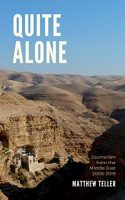 One of the many things I’ve learnt from Quite Alone, Matthew Teller’s new collection of writing on the Middle East, is that in Hebrew “tour guide” is moreh derekh, a teacher of the road.
One of the many things I’ve learnt from Quite Alone, Matthew Teller’s new collection of writing on the Middle East, is that in Hebrew “tour guide” is moreh derekh, a teacher of the road.
Teller himself is a teacher worth following. The articles gathered here are drawn from the past dozen years, but informed by an association with the region that goes back four decades. Among them is one on the rock-hewn city of Petra, in Jordan, which he has visited, he reckons, 20 times. His ambition, beautifully realised, is to see it afresh.
There are articles from every country in the region between Egypt and Oman, apart from Yemen, where he hasn’t been (but whose people’s suffering he urges us, in his introduction, not to forget). They were written for various outlets and range in subject from art and architecture, via travel, to the plight of stateless people in Kuwait. If they have a common thread, he says, it is “a desire to amplify the voices of the overlooked and the under-served” and to help “demolish” stereotypes about the Middle East.
They certainly do that. In Jordan, a country that is 95 per cent Muslim, he introduces us to Omar Zumot, who makes wine. In Dubai, he meets Father Lennie Connully, parish priest of St Mary’s, a Roman Catholic church that stands next door to a mosque and which draws 7,000 people to its Friday Mass.
He has left the articles largely unedited since they were written, and here and there I found myself wondering what had changed in the interim. How for example, has the Arabian oryx been faring since he reported, in 2009, on efforts to save it?
The travel pieces raise fewer questions of that kind. In two of the best, published in 2012 in consecutive issues of the monthly magazine Wanderlust, he reports on what it’s like to travel independently in Palestine and then in Israel. In another, from a couple of years later, he joins Breaking Bread Journeys, which was founded by Elisa Moed, an Israeli, and Christina Samara, who is Palestinian, and which aims to link sites and experiences normally cut off from each other. Their initiative, he says, “leaves you feeling that the physical barriers restricting travel in the Middle East are insignificant, compared with the mental ones”.

Leave a Reply